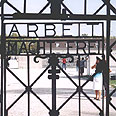
Dachau's restored gates: Museums and monuments can’t quell fear
Photo: Yoram Rosenzweig
I count myself lucky to have been probably in one of the last cohorts of high school students not to be shipped off to Poland to participate in the demonstrations of national pride on the sites of the death camps.
It’s not that I oppose the visits as such. It is only that they appear to be geared to consolidate a single mindset: the answer to the Holocaust is a strong and secure Israel.
Don’t get me wrong: I am all in favor of a strong and secure Israel. I have a very personal stake in that. But I always cringe at the thought that this is what the Jewish people take away or should take away from the Holocaust.
A few years ago I visited Germany for the first time to see an American friend who was spending a year there. I did not come in search of history. Yet, unable to help myself, I spent most of my time touring the sites of the Third Reich in Berlin. History is just too present in Berlin to ignore it.
Listening to the tour guide, talking with young Germans, I was overcome by an uneasy feeling that the way that the Germans were remembering and teaching the Holocaust was but a mirror image of the way we were doing so in Israel. The Holocaust was the challenge. A pacifist Germany is the answer.
So this was the lesson: the Germans must never again become mass murderers, and the Jews must never again become victims
These are lessons driven by fear; they are mirror images of the same fear. The Germans fear themselves. They are afraid of what is within them. Afraid of what they were and what perhaps they might become again. Driven by that fear, they have adopted a position of militant pacifism that is as disconcerting as its opposite.
Museums and monuments can’t quell fear
The Jews are haunted by the fear that the victims they were is what they may become again. The Jews fear the other. We fear the world. We fear that what has been done to us in the past will be done to us again. We are victims in waiting.
Elie Weisel is right to say that not all the victims were Jews, but that all the Jews were victims. But is this always true? Will this always be true? Too many of us behave as if it is.
For both Germans and Jews there is an ever-present fear, which big museums and large monuments never quell.
Of all the world’s madnesses, the Holocaust continues to be one with which we are still grappling. We do not know what to do with the Holocaust. We fear to probe its depth.
So we remember. We erect museums and memorials until the day will come when we will understand.
We know that something so big, so mad has to mean something. But we don’t yet know what. We realize that in some way it calls upon us to build a world in which a Holocaust is no longer possible, but we don’t yet know how to do it. And we don’t yet even know what further Holocaust do we want to prevent.
Shoah continues to loom large
Is it any genocide? Or the murder of Jews? Or perhaps the murder of Jews by Germans?
Germany and Israel have borne the burden of trying to fathom the meaning of the Holocaust. But I think we have failed. We have given only limited answers.
This is the reason why 60 years later, the Holocaust continues to loom large in the global consciousness. Its power does not fade with time. And it will continue to be there until we learn its secrets, until we fathom its lessons, until we accept the mission with which it entrusts us.
Israel and Germany can and should lead the way.
If we will find it within us to overcome our fears of becoming again that which we were; if we will take upon ourselves the mission to fathom the depths of the Holocaust and find within it a hope and positive vision for the world in its entirety; if we will find it within us to go beyond what the Holocaust means to Germans and to Jews, we might perhaps find a path to a world that does not fear to come to terms with the darkness that lies within the human soul, yet finds the courage to let the light within it shine.















